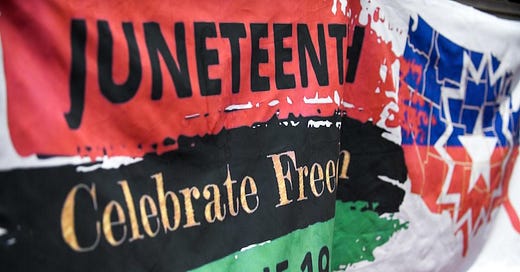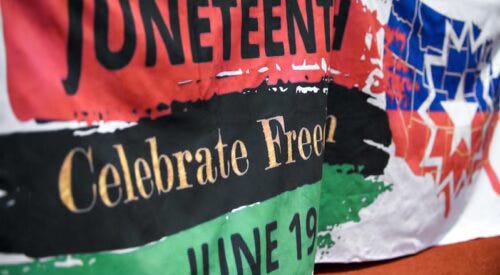Juneteenth is a celebration of Black resiliency and joy
It’s also a day to think about systemic inequalities Black Americans face in criminal justice.
NADIA E. BROWN AND CHRISTINE M. SLAUGHTER
In 2021, President Joe Biden declared Juneteenth a federal holiday, a national day to commemorate the end of slavery in the United States. On June 19, 1865, enslaved persons in Galveston, Texas, were informed of their freedom – which had been established through the signing of the Emancipation Proclamation on Jan. 1, 1863, two years prior. Some Black Americans were not freed however, until Dec. 6, 1985, and the ratification of the 13th Amendment.
In 1979, Texas was the first state to establish Juneteenth as an official holiday. According to a recent poll from the Barbara Jordan Public Policy Research and Survey Center, 77% of Texans have a great deal of knowledge about this holiday.
Above all, Juneteenth recognizes Black liberation from systemic racial injustices and the beginning of new lives for the formerly enslaved. But when thinking about freedom for Black Americans, it’s important to consider the historical and contemporary contexts of policing and incarceration. Today, Black Americans in prison or in jail represent 37% of the incarcerated population, according to the Prison Policy Initiative.
Modern Day Policing Has Roots In Enslavement
Some argue that modern-day policing has its origins in slavery. This is a complicated claim, however. In the 1700s, enslaved people were forced to labor on plantations. If they ran away, police returned the enslaved to these plantations. In this way, police acted as “slave patrols.” After the Civil War, police forces served during Reconstruction to maintain economic and racial segregation between Black and white Americans. Law enforcement was explicitly used to enforce racial inequality.
After slavery was abolished, Black codes served to criminalize the ordinary behavior of African Americans during Reconstruction. These laws penalized vagrancy, standing around, and staying out too late. Ultimately, the enforcement of these laws led many formerly enslaved African Americans into jails and prisons. Black codes also restricted Black Americans from other aspects of American citizenship, including voting, marriage, and property ownership.
The perceived criminality of Black Americans helped feed a culture of racial terror and violence. Throughout the South in particular, but all over the United States, white mobs used criminal allegations to enact vigilante violence against Black Americans, leading to decades of lynchings. Between 1877 and 1950, there were over 4,804 known lynchings in the Southern states – and more than half of lynching victims had been accused of a crime.
Prison Labor Mirrored Enslavement
The Emancipation Proclamation did not outlaw prison labor. And a “loophole“ of the 13th Amendment allows legalized slavery – forced prison labor – as punishment for a crime. Rebuilding the South after the Civil War relied on unpaid prison labor. States “leased” incarcerated people to corporations, a practice referred to as “convict leasing.”
America’s prisons today also retain labor practices where workers have minimal to no labor rights, mirroring one component of slavery in America. In 2017, for example, most incarcerated people earned less than one dollar an hour. Incarcerated people in Southern states, in fact, earned even less.
Racial Inequities In Policing
During the Civil Rights Movement, police were used for “riot” and crowd control. Few can forget the images of police violence and brutality against peaceful protesters. Law enforcement agencies frequently used violence to suppress demonstrations for racial justice.
Decades later, high-profile arrests, such as the 1992 police beating of Rodney King in Los Angeles in 1992, highlight the tensions between Black Americans and the often, but not exclusively, white police force. In recent years, the murders of numerous Black Americans, such as George Floyd in 2020, highlight the magnitude of mistrust between Black Americans and the police. #SayHerName campaigns, in particular, highlight the gendered police brutality Black women experience.
Racial profiling, sexual harassment, stop and frisk, the war on drugs, among other police practices, have maintained a tense relationship between police and Black Americans. Police are the first, and one of many, encounters with the criminal legal system for many Black Americans who reside in race-class subjugated communities. Disparities in arrests, fines, and sentencing have harmful effects on Black Americans in the criminal legal system, and inequalities extend beyond the effects of interactions with police. The disparities are particularly stark within the judicial system, and the sentencing process. According to the Sentencing Project,Black Americans account for over 48% of prisoners serving life sentences, or sentenced to life without parole – yet Black Americans comprise a smaller fraction of the overall U.S. population.
So What Does Juneteenth Mean In The Trump Era?
For many Black Americans, Juneteenth celebrations do not fully represent a day of freedom and emancipation. Black studies scholar Keeanga-Yamahtta Taylorcontends the Black Lives Matter Movement has transformed the public conversation about democracy and the role of race/racism in the United States, and globally.
Indeed, political scientist Robert Mickey argues that anti-Black violence is a hallmark of American democracy. Racial violence has become entrenched within government institutions in the form of policing and the operation of courts. Racism, class oppression, and other systemic issues exacerbate police brutality against Black Americans.
Political scientist Megan Ming Francis contends that concepts of justice and democracy have shifted in American public consciousness because the Black Lives Matter Movement highlighted anti-Blackness in the political process and policing. She argues that Juneteenth is a holiday that should help the American public recognize and acknowledge forms of institutionalized anti-Blackness.
Yet, the Trump administration is loath to acknowledge systemic racism and anti-Blackness in America. Rather, the president instructed universities and government agencies to prohibit the pursuit of equal opportunity, and ban diversity, equity, and inclusion programs Since taking office in 2025, Trump has cut funding to Black institutions that retell the narrative of Black agency in the face of oppression, such as the Massachusetts Black History Museum.
Recent attempts at transforming police practices appear to have little traction with Trump at the helm. For example, Trump signed executive orders in his first 100 days in office that commit to policing that is militarized and unaccountable. The White House argues that these changes are necessary to protect average Americans from criminals – but who Trump views as criminals and in need of policing is rooted in anti-Blackness.
Trump campaigned on law and order as a thinly veiled racial appeal. The president continues to rally federal forces to police the movement of Angelenos protesting against immigration raids in Los Angeles by ICE officials. The police – and National Guard – were called to Los Angeles to maintain social order. But many Americans see these actions as part of the administration’s views about a broader racial order, consistent with Trump’s efforts to reverse many of the progressive changes in the aftermath of the 2020 protests against racial injustices.
Black Americans Remain Distrustful Of The Police
Given the current political climate and the history of policing, we have been interested in learning how Black Americans think about policing. Our questions about trust in the police were included in a subsample of 1,000 respondents to the 2024 Cooperative Election Study (CES). The large CES sample can show demographic and ideological breakdowns with more precision than most other surveys. The sample is weighted to be representative of American adults on a range of demographic and political factors.
The 2024 CES was administered both before and after the election. We asked how much respondents agreed that “Black residents in my community trust the police.” The responses showed significant mistrust between Black communities and law enforcement, with 45% strongly disagreeing and 44% of Black Americans neither agreeing nor disagreeing that Black Americans trust the police. So less than 1% of Black Americans interviewed in the 2024 CES agreed that Black residents in their community trust the police. These results highlight a serious problem with police legitimacy.
When the same CES respondents in 2024 were asked whether they agreed with the statement that “White residents in my community trust the police,” 70% of Black Americans agreed. Only 5% of Black Americans believed that white Americans in their neighborhoods did not trust the police. The results show a significant racial gap in perceptions of police legitimacy.
Juneteenth has carried a dual meaning: celebration, but also a reckoning.
Juneteenth, But Still Not Free
The legacy of enslavement and its linkages with the origins of policing and the maintenance of “law and order” in society still shape Black Americans’ distrust of law enforcement, hundreds of years later. Even as Americans celebrate Juneteenth, they are reminded that freedom is far from reality for some.
Celebrations in honor of Juneteenth have ranged in name from Day of Jubilee, Freedom Day, Liberation Day, and Emancipation Day. These monikers vary by location, as Black Americans dispersed throughout the United States during the Great Migration. But these titles are a stark reminder that some African Americans still experience inequalities.
Throughout the violence and disparities in policing, Black Americans have engaged in abolitionist movements that go beyond efforts to change and improve policing in America. Yet, these movements are met with backlash as well. This leaves us with a pressing question: For whom is freedom truly realized?
Nadia E. Brown is a professor of government and the director of the Women’s and Gender Studies program at Georgetown University. She is the author of Sisters in the Statehouse (Oxford University Press, 2014.
Christine M. Slaughter is an assistant professor of political science at Boston University.





https://open.substack.com/pub/poetpastor/p/we-have-survived-before?r=5gejob&utm_medium=ios